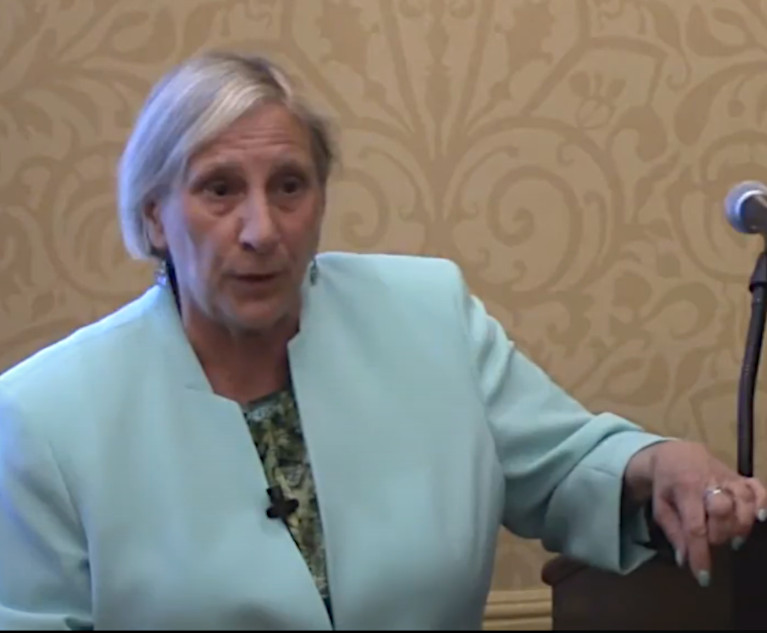Ohio Court Staffer's Hostile Work Environment Claim Against Judge Revived
The plaintiff, a docket coordinator, claimed the judges "formulated a concealed plan and policy that female FCMC employees asserting complaints about abusive and discriminatory treatment at the hands of Judges would be discouraged and intimidated into silence."
August 16, 2019 at 04:14 PM
3 minute read
 Photo: Andrey_Popov/Shutterstock.com
Photo: Andrey_Popov/Shutterstock.com
A federal appeals court has revived a claim made by an Ohio court staffer alleging that a judge of the Franklin County Municipal Court created a hostile work environment by making sexist and racist comments.
The U.S. Court of Appeals for the Sixth Circuit affirmed the lower court’s dismissal of most of plaintiff Andrea Boxill’s claims against four judges—including First Amendment retaliation and civil conspiracy—but reversed the dismissal of hostile work environment claim against defendant Judge James P. O’Grady.
Boxill, a docket coordinator, sued O’Grady, and fellow judges Michael Brandt, Carrie Glaeden and James Green, claiming they “formulated a concealed plan and policy that female FCMC employees asserting complaints about abusive and discriminatory treatment at the hands of Judges would be discouraged and intimidated into silence,” according to an opinion from Judge Jane B. Stranch of the U.S. Court of Appeals for the Sixth Circuit.
The plaintiff claimed that in 2011, O’Grady began making comments she found hostile and intimidating. According to Stranch, Boxill reported the alleged harassment to administrators and judges at the municipal court—including Green and Shaw—several times between 2011 and 2013.
She alleged that “[n]o administrator or Judge acted on these reports, but each discouraged [her] from action,” according to the opinion. Boxill also claimed she was demoted after the matter of O’Grady’s alleged behavior came to the attention of the other judges, one of which had written a letter expressing concern over the liability O’Grady presented.
Non-defendant Judge Scott VanDerKarr wrote that letter, but Brandt told Shaw to rewrite it and “tone it down,” Boxill alleged.
Stranch said Boxill’s claim about the letter showed some of the judges took proactive steps to address her allegations. Additionally her allegations against them were vague, so she could not state a plausible claim against those defendants.
However, with O’Grady it was a different matter. Stranch said the allegations were specific enough to move forward.
Returning to the letter, Stranch said “Eventually, in 2014, VanDerKarr drafted a letter—circulated among Brandt, Shaw, and Glaeden—’in which he reported O’Grady’s creation of a hostile work environment’ at the courthouse. Shaw later ‘tone[d] down’ this letter; but even the revised letter concluded ‘that, if left unaddressed, Judge O’Grady’s behavior [might] result in future litigation that could subject [FCMC] to liability, possibly for the creation and continuation of a hostile work environment, and the payment of damages.’”
Stranch added, “Boxill’s complaint therefore plausibly alleges that (1) O’Grady made sexist and racist comments directed at her and others for years, (2) she reported to her superiors that O’Grady’s harassment was interfering with her ability to work, and (3) this harassment was sufficiently severe and/or pervasive that judges and administrators at the courthouse felt it necessary to memorialize their concerns about his behavior in writing.
“At the pleading stage, these allegations state a plausible hostile work environment claim against O’Grady,” she said.
Columbus-based attorney Michael G. Moore represents Boxill and did not respond to a request for comment.
Linda Woeber of Montgomery Jonson in Cincinnati, who represents the defendants, declined to comment.
This content has been archived. It is available through our partners, LexisNexis® and Bloomberg Law.
To view this content, please continue to their sites.
Not a Lexis Subscriber?
Subscribe Now
Not a Bloomberg Law Subscriber?
Subscribe Now
NOT FOR REPRINT
© 2025 ALM Global, LLC, All Rights Reserved. Request academic re-use from www.copyright.com. All other uses, submit a request to [email protected]. For more information visit Asset & Logo Licensing.
You Might Like
View All
A Plan Is Brewing to Limit Big-Dollar Suits in Georgia—and Lawyers Have Mixed Feelings
10 minute read
HUD Charges Texas HOA With Housing Discrimination in Last Days of Biden Administration
5 minute read
Trending Stories
- 1Bass Berry & Sims Relocates to Nashville Office Designed to Encourage Collaboration, Inclusion
- 2Legaltech Rundown: McDermott Will & Emery Invests $10 million in The LegalTech Fund, LexisNexis Releases Conversational Search for Nexis+ AI, and More
- 3The TikTokification of the Courtroom
- 4New Jersey’s Arbitration Appeal Deadline—A Call for Clarity
- 5Law Firms Look to Gen Z for AI Skills, as 'Data Becomes the Oil of Legal'
Who Got The Work
J. Brugh Lower of Gibbons has entered an appearance for industrial equipment supplier Devco Corporation in a pending trademark infringement lawsuit. The suit, accusing the defendant of selling knock-off Graco products, was filed Dec. 18 in New Jersey District Court by Rivkin Radler on behalf of Graco Inc. and Graco Minnesota. The case, assigned to U.S. District Judge Zahid N. Quraishi, is 3:24-cv-11294, Graco Inc. et al v. Devco Corporation.
Who Got The Work
Rebecca Maller-Stein and Kent A. Yalowitz of Arnold & Porter Kaye Scholer have entered their appearances for Hanaco Venture Capital and its executives, Lior Prosor and David Frankel, in a pending securities lawsuit. The action, filed on Dec. 24 in New York Southern District Court by Zell, Aron & Co. on behalf of Goldeneye Advisors, accuses the defendants of negligently and fraudulently managing the plaintiff's $1 million investment. The case, assigned to U.S. District Judge Vernon S. Broderick, is 1:24-cv-09918, Goldeneye Advisors, LLC v. Hanaco Venture Capital, Ltd. et al.
Who Got The Work
Attorneys from A&O Shearman has stepped in as defense counsel for Toronto-Dominion Bank and other defendants in a pending securities class action. The suit, filed Dec. 11 in New York Southern District Court by Bleichmar Fonti & Auld, accuses the defendants of concealing the bank's 'pervasive' deficiencies in regards to its compliance with the Bank Secrecy Act and the quality of its anti-money laundering controls. The case, assigned to U.S. District Judge Arun Subramanian, is 1:24-cv-09445, Gonzalez v. The Toronto-Dominion Bank et al.
Who Got The Work
Crown Castle International, a Pennsylvania company providing shared communications infrastructure, has turned to Luke D. Wolf of Gordon Rees Scully Mansukhani to fend off a pending breach-of-contract lawsuit. The court action, filed Nov. 25 in Michigan Eastern District Court by Hooper Hathaway PC on behalf of The Town Residences LLC, accuses Crown Castle of failing to transfer approximately $30,000 in utility payments from T-Mobile in breach of a roof-top lease and assignment agreement. The case, assigned to U.S. District Judge Susan K. Declercq, is 2:24-cv-13131, The Town Residences LLC v. T-Mobile US, Inc. et al.
Who Got The Work
Wilfred P. Coronato and Daniel M. Schwartz of McCarter & English have stepped in as defense counsel to Electrolux Home Products Inc. in a pending product liability lawsuit. The court action, filed Nov. 26 in New York Eastern District Court by Poulos Lopiccolo PC and Nagel Rice LLP on behalf of David Stern, alleges that the defendant's refrigerators’ drawers and shelving repeatedly break and fall apart within months after purchase. The case, assigned to U.S. District Judge Joan M. Azrack, is 2:24-cv-08204, Stern v. Electrolux Home Products, Inc.
Featured Firms
Law Offices of Gary Martin Hays & Associates, P.C.
(470) 294-1674
Law Offices of Mark E. Salomone
(857) 444-6468
Smith & Hassler
(713) 739-1250









